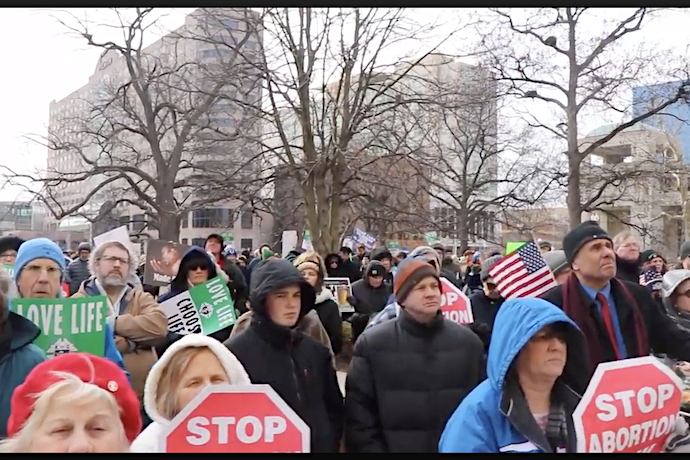I was born (and mostly raised) in Indiana, so let me start off with some classic Midwestern understatement: I’m not thrilled with Indiana’s political trajectory.
Okay, now that my Hoosier bona fides are out of the way, let me tell you how I really feel: This week I’m once again deeply disappointed by my home state, which I’ve avoided living in as much as possible throughout my adult life. Indiana rarely disappoints at being a disappointment, and as a queer person I don’t feel particularly safe or welcome there. And while the current news cycle highlights the dangers the state poses to both cisgender women and transmasculine folks who can get pregnant, I couldn’t honestly recommend moving to Indiana to any marginalized person not already tied to it for some personal reason.
To be sure, I was encouraged when the state’s electoral votes went to Barack Obama in 2008—the first (and still only) time Indiana had voted for a Democrat for president since 1964—but that moment has proven to be a fluke. More recently, it was embarrassing enough to go through four years with former Indiana governor and Christian theocrat Mike Pence (the man singularly responsible for mishandling and worsening an HIV outbreak in Indiana in the 2010s) as Donald Trump’s vice president. But not since the 2015 media brouhaha over Indiana’s anti-LGBTQ Religious Freedom Restoration Act (RFRA) has the Hoosier State gotten the kinds of national headlines it’s getting now, in the wake of a ten-year-old rape victim receiving an urgent abortion there that the young girl was refused in Ohio.
The doctor who provided the child with abortion care, Caitlin Bernard, is unequivocally a hero. Indiana, like any red state, has its share of good people and everyday heroes, and in that spirit let me say, in the words of celebrated Hoosier novelist and satiric wit Kurt Vonnegut, “Hooray for our team.” (Although he always made much of his Hoosier roots, Vonnegut moved away from Indianapolis early in his writing career and spent the rest of his life residing in Massachusetts and New York—make of that what you will.)
Heroic Hoosiers aside, Indiana isn’t currently in the national news cycle for being a welcoming haven for victims of barbaric abortion bans. Quite the opposite. The latest press comes because the state may impose a new ban as draconian as Ohio’s in a special session of the state legislature set to start on July 25, and because State Attorney General Todd Rokita has, in a fit of rabid anti-abortion zeal, subjected Dr. Bernard to a vicious smear campaign. Dr. Bernard has taken steps toward a defamation lawsuit against Rokita.
After Republicans nationally made fools of themselves by initially denying the existence of the ten-year-old pregnant rape victim, many Indiana Republicans—politicians and rank-and-file activists—have since been working to make it impossible for someone like her to get the help she needs in the Hoosier State.
This is every bit as monstrous as it sounds, though not really out of character for a state that has already prosecuted and convicted women of color for miscarriages. As anthropology PhD student Hilary Agro recently tweeted, even putting psychological and moral concerns aside, a ten-year-old girl’s body is not physically mature enough to withstand the strains of pregnancy and childbirth:
Increased nutritional intake causing earlier hormonal shifts leading to menarche does not speed up the physiological development of the skeletal changes necessary to survive childbirth.
Even more importantly, it does not make literal children emotionally ready to become parents.
— Hilary Agro 🍄 (@hilaryagro) July 18, 2022
To be clear, it is indeed morally contemptible to force a ten-year-old child to give birth, in the process subjecting her to many horrific consequences including psychological damage. It’s also very possibly a death sentence. The Washington Post reports that in Brazil, where abortion is criminalized, children aged 10-14 who become pregnant “are five times more likely to die in childbirth than women over 20, and also have greater chances of suffering uterine ruptures, preeclampsia and anemia.”
After Roe v. Wade was overturned by the illegitimate Roberts Court last month, Indiana petitioned the Supreme Court for an expedited decision regarding a law that had been stayed by a federal appeals court—a law requiring parents to be notified when a minor seeks an abortion (unless the minor is able to get a court to rule that parental notification would not be in the minor’s best interest). On Monday, Chief Justice John Roberts obliged, making it far less likely that any Hoosier in a situation like that of the ten-year-old from neighboring Ohio will be able to receive needed care without traveling out of Indiana.
But many right-wing Christian Hoosiers want to go even further, and they’re likely to prevail, according to Sue Ellen Braunlin, MD, co-president of Indiana Religious Coalition for Reproductive Choice. (Full disclosure: I received an honorarium for participating in a dialogue hosted by IRCRC in 2019.)
Reached for comment, Braunlin told RD that IRCRC has been in communication with its New Mexico and Ohio affiliates “about ways to support people who need services.” Hoosier reproductive justice advocates are also working with their counterparts in Illinois, who are “preparing to receive patients from here.”
She also provided RD with a broader assessment of the state of affairs in Indiana, noting that, while the Republican faction that includes Rokita wants a total abortion ban, “The business community usually doesn’t want Indiana to be an outlier like we saw on RFRA.” She added, “They are embarrassed by Indiana’s extremely high maternal mortality and know a total ban is certain to raise it, marking Indiana as dangerous.”
In GOP-controlled states, local social justice advocates are often forced to rely on “pro-business” Republicans to shoot down the most draconian aspirations of their fellow party members who are more strictly driven by right-wing Christian ideology. As I learned when reporting on the state persecution that transgender children and their families now face in Texas, the pro-business Republican faction in that state had previously prevented some inhumane anti-trans bills from being passed.
In Indiana, with the special legislative session about to begin, supporters of reproductive justice and their opponents are now squaring off. ACLU of Indiana, Planned Parenthood Alliance Advocates, and Women4Change Indiana are hosting a “Bans Off Indiana” rally at the Indiana Statehouse on July 25. Indiana Right to Life, meanwhile, which has plenty of good things to say about AG Rokita, is holding a “Love them Both” rally at the statehouse on July 26—“both” referring, of course, to the pregnant person and the fetus, particularly ugly and tone-deaf messaging when you consider what that “love” means to a ten-year-old girl impregnated through rape.
Meanwhile, a campaign called Business Leaders for Hoosier Liberty is gathering signatures on a petition to Indiana lawmakers not to further restrict abortion access in the state. Braunlin says of pro-business Republicans that “they speak up late” on the issues of justice that seem likely to affect their bottom line, but they do eventually speak up. She also thinks there’s been something of a sea change since the overturning of Roe: “I sense a lot of people who have been silent on repro controversy seem to be speaking out in horror of Roe going down and the near certainty of more restrictions in Indiana.”
Perhaps the motivation that comes from this horror will be enough to stave off the worst in Indiana, at least for now. But whatever flimsy bulwark against extremist zeal the pro-business sentiment of “moderate” Republicans provides cannot be counted on to to hold against the Christian Right’s surging power, as Texans have learned. Whatever the outcome in Indiana, one message to Hoosiers who can get pregnant is coming through loud and clear. Plenty of their fellow Hoosiers are Christian zealots who would rather see them suffer horrors up to and including preventable deaths than allow a single abortion to take place in the state.
Alluding to the perennial “brain drain” problem that Republican politicians in Indiana occasionally claim to care about, the Business Leaders for Hoosier Liberty petition reads in part, “In an era of remote work, talented individuals can live just about anywhere, and if Indiana passes a restrictive law, they won’t choose this state as their home.” I don’t usually trot out my credentials like this, but as a former Whitinger Scholarship recipient at Ball State University who graduated summa cum laude and received the 2003 Provost’s Prize for outstanding graduating senior, and who now holds a PhD from Stanford, all I can really say to the Business Leaders for Hoosier Liberty is: hey from Oregon.
I miss Indiana sometimes, particularly in the summer. Growing up, I always loved swimming in my grandparents’ pool, going to outdoor concerts at Conner Prairie, getting frozen custard, watching the thunderstorms, and listening to the chorus of cicadas filtering down from the lush broadleaf trees that cover so much of the central Indiana landscape—at least the parts not covered with corn and soybeans.
Abortion bans may not affect me directly, but I care about the people they do affect. I also know that my queer civil rights are unlikely to survive the current Christian Right onslaught in states like Indiana. At the end of the day, elite Republican embarrassment at the extent of the unmasked rank-and-file Republicans’ bloodlust toward marginalized people will never provide me with enough of a sense of security to make settling down “back home again in Indiana” palatable—and I know I’m far from alone in that.





